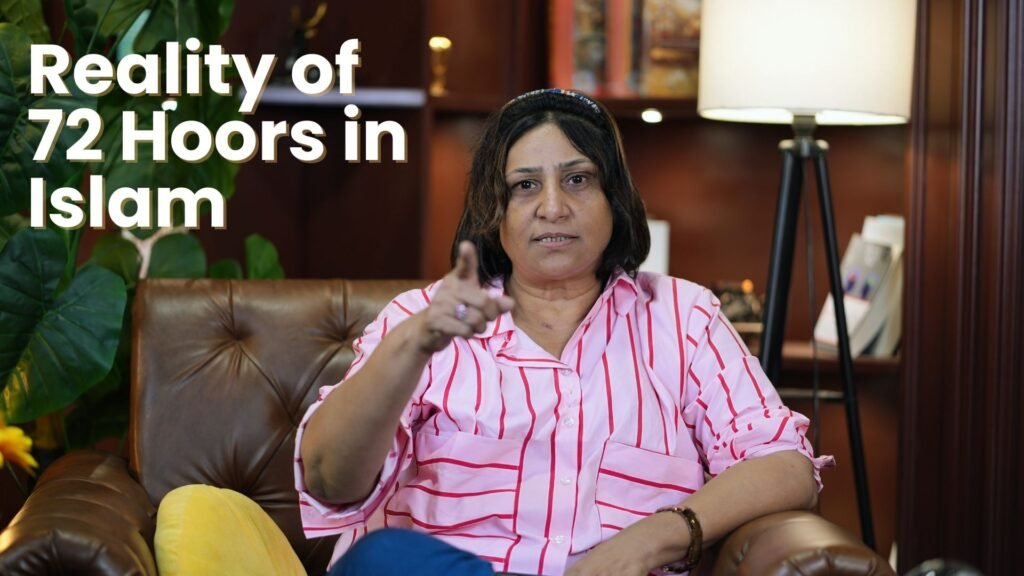In a world where religious beliefs are often misunderstood, misused, or blindly followed, it takes courage to speak the truth, especially when it involves questioning long-held traditions. In this powerful podcast episode, with Shabnam Khan, a fearless Indian Muslim woman, human rights activist, and national spokesperson for the Nishad Party. Known for her clarity, courage, and compassion, she challenges many social and religious issues, from triple talaq to the concept of 72 hoors in paradise.
In today’s episode, she sheds light on a topic that is often sensationalized but rarely questioned: Where does the idea of 72 hoors come from, who promotes it, and why it’s problematic, especially for Muslim women.
Where Does the Concept of 72 Hoors Come From?
One of the most commonly repeated ideas in certain Islamic circles is that a man will be rewarded with 72 hoors (virgins or heavenly women) in paradise. But where did this idea actually originate?
Contrary to popular belief, the Quran does not mention “72 hoors” anywhere. It does speak about “pure companions” (ḥūr ʿīn) in paradise, but in symbolic, poetic language meant to reflect the peace and beauty of the afterlife, not carnal pleasures.
The number 72 is found only in some Hadiths (sayings attributed to Prophet Muhammad), specifically in Tirmidhi, and even those are debated in terms of authenticity and interpretation. Many Islamic scholars argue that these Hadiths are either weak or taken out of context.
Who Promotes This Idea And Why?
The concept is mostly promoted by ultra-conservative mullahs, preachers, and certain radical ideologies. It’s used to:
- Glorify martyrdom
- Create fantasies of male rewards in heaven
- Keep women silent while offering men promises of pleasure
Unfortunately, it’s repeated so often that many believe it’s written in the Quran, which it’s not.
What Shabnam Khan Says About It
As a Muslim woman who knows the real teachings of Islam, Shabnam Khan boldly challenges this concept.
She asks:
“If a man couldn’t respect or value the one woman he had in this life as his wife, then how can he dream of 72 in the afterlife? What did he do to deserve that?”
Her concern isn’t just theological, it’s social and moral. Shabnam believes this concept has been used as a tool to brainwash men, especially the youth, into believing paradise is about pleasure, not purpose.
She also highlights the gender inequality within the idea, while men are promised rewards, women are promised obedience. No equal reward, no spiritual elevation, just silence and sacrifice.
“Islam is not about lust. Islam is about peace, justice, and equality. And this idea of 72 hoors distorts that completely.”
Why This Concept is Problematic and Misleading
Shabnam Khan explains why the 72 hoors concept is not only factually incorrect but also morally damaging:
- It objectifies women – treating them as rewards for men’s actions
- It creates false expectations – especially in young minds
- It promotes gender inequality – offering no equal vision of paradise for women
- It distracts from real faith – focusing on fantasy, not spirituality
- It allows manipulation – especially by conservative clerics who want control
According to Shabnam, when such concepts are normalized, they damage both men and women. Men grow up with entitlement, and women are raised with fear and silence, all in the name of religion.
What Islamic Texts Actually Say
Shabnam insists on going back to the Quran, the true source of Islamic belief.
- The Quran: Mentions “companions” and rewards of paradise in symbolic terms, not physical or sexual promises. It talks of righteous people, peace, gardens, and spiritual contentment.
- Hadiths: Some Hadiths do mention 72 hoors, but their authenticity is questioned, and even if considered, they are not to be taken literally or universally applied.
She believes Islam’s essence is spiritual, not sensual, and any interpretation that leads to oppression or inequality is not in line with the faith’s true message.
Shabnam’s Final Stand is that Islam is Misread & Women Deserve A Better place
Shabnam Khan says the problem is not with Islam, but with how it is being misread and misused by some called Mullahs.
“When Prophet Muhammad said that women are the crown of a man’s head, he gave them respect and dignity. But today, women are being treated as tools, prizes, or slaves. That’s not Islam. That’s injustice.”
As a Muslim woman from within the community, Shabnam knows the culture, the mindset, and the real struggles. That’s why her voice matters. She isn’t speaking against her religion, she’s speaking to clean it from misinterpretation and male dominance.
Her mission is to make Muslims, especially women, realize their rights, value, and power. To rise with education, equality, and confidence, and to bring the true spirit of Islam back into daily life.
Final Words from the Podcast
Religion is meant to guide, not to control. Islam gave women rights 1400 years ago, the real challenge is to practice those rights today, not bury them under fear and false promises.
Let’s stop promoting fantasies like 72 hoors and start promoting equality, peace, and justice, the real rewards of a meaningful life and a spiritual faith.
Social Media Links of Shabnam Khan
Instagram – https://www.instagram.com/khanshabnamf/

Follow YTMahendra Podcast:
📌 YouTube: / @ytmahendrapodcast
📘 Facebook: / ytmahendrapodcast
📷 Instagram: / ytmahendrapodcast
🐦 Twitter/X: https://x.com/ytmpodcast
💼 LinkedIn: / ytmahendrapodcast
Listen to Our Podcast On:
🎙️ Spotify (Creator Dashboard): https://podcasters.spotify.com/pod/sh…
🎵 Spotify (Public): https://open.spotify.com/show/1YttdaX…
🍎 Apple Podcast: https://podcasts.apple.com/us/podcast…
🎙️ Amazon Music: https://music.amazon.in/podcasts/6600…
🎶 JioSaavn: https://www.jiosaavn.com/shows/ytmahe…
For Business & PR Collaborations :-
📧 Email: podcast@ytmahendra.com







